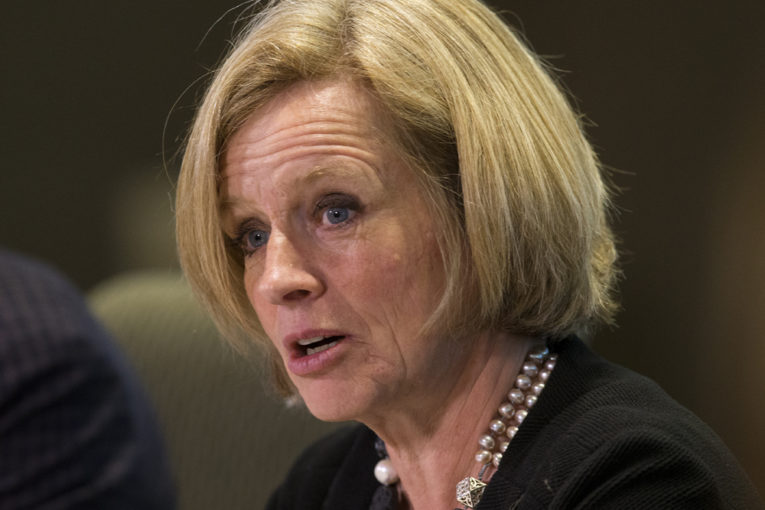
As Premier Rachel Notley threatens to assemble the ultimate weapon in the pipeline fight — legislation to throttle back oil and gas shipments to B.C. and, potentially, the rest of Canada — the energy industry is divided on the tactic.
But Notley calls the potential measure “a little bit of short-term pain for some long-term gain” to get the Trans Mountain expansion project built to the west coast.
The Alberta government is looking to turn up the pressure on British Columbia over its opposition to the $7.4-billion pipeline and the premier knows the idea of turning down the energy taps makes some industry players distinctly nervous.
In an interview, Notley said any restriction on oil or natural gas leaving the province could affect petroleum products moving to B.C. and the rest of Canada.
The premier wouldn’t reveal specifics of the bill, saying her government is “looking at the best, simplest, cleanest way to give ourselves as many tools as we can …
“We had the wine ban and we’re talking now about giving ourselves the authority to impact how much of our refined product – or other non-renewable resource products – move around.”
Industry’s response has been mixed.
Both the Petroleum Services Association of Canada and Canadian Association of Oilwell Drilling Contractors see it as a necessary step to get the attention of B.C. Premier John Horgan and Ottawa.
However, the industry’s largest group, the Canadian Association of Petroleum Producers, doesn’t back the measure.
The premier wouldn’t tip her hand about how the province might support companies hurt by the restrictions, but stressed she will discuss the matter with the oilpatch and no one will be surprised.
“When we talk about how much industry is losing every day through a failure to have proper access to pipelines in Alberta, we’re all losing, right?
“Albertans are losing. The treasury is losing. The economy is losing and obviously individual companies are not earning what they should be earning, every day, because of the failure to make adequate progress on these pipelines,” Notley said.
“We have to balance that off against each other, so (it’s) a little bit of short-term pain for some long-term gain.”
The political conflict between B.C. and Alberta has ratcheted up in recent months over Kinder Morgan’s expansion of the Trans Mountain pipeline, a federally approved project that would triple the amount of oil moving from the Edmonton area to Burnaby.
With existing pipelines full, the bottleneck is crimping prices for heavy oil producers.
The Alberta government estimates the steep oil price differential has cut an estimated $500 million from bitumen royalties this fiscal year. Heavy oil producers are missing out on up to $40 million a day in revenues.
A B.C. government proposal to restrict the amount of bitumen that can be shipped into the province was pulled off the table last month following Alberta’s wine ban. Instead, the Horgan government’s proposal will be referred to the B.C. courts.
But the brinksmanship continues.
Notley’s declaration Thursday her government would consider developing legislation to reduce oil shipments — potentially spiking gasoline prices in B.C.’s Lower Mainland — has received varied reviews from industry.
“We are encouraging governments to use the tools they have that wouldn’t further damage our industry,” CAPP president Tim McMillan said in an interview last week.
“A tool that is damaging to the energy sector is working against the objective of the initiative.”
The Alberta-based owner of the Burnaby refinery, which receives oil shipped through the Trans Mountain line and supplies gasoline to the Lower Mainland, said it’s reached out to both provinces to discuss the issue.
“Any measure that restricts the supply of oil to British Columbia would be negative for both economies,” said a statement from Parkland Fuel Corp.
Other energy leaders say they don’t want to see oil shipments disrupted, but insist they have the premier’s back if such moves are required.
“If we have to fight tough the way the premier is talking, then that’s what we have to do — and we’d support it,” said Mark Salkeld, chief executive of PSAC, which represents the petroleum industry’s service, supply and manufacturing sectors.
“I know where CAPP is coming from, and it’s their customers and it would be shutting down revenues … but we need this pipeline.”
Export restrictions could hurt a producer’s bottom line, but it’s necessary for the good of the industry — and the country — to take action to get the pipeline built, said Grant Fagerheim, CEO of Whitecap Resources.
The Calgary-based producer doesn’t move oil on the Trans Mountain line, but Fagerheim said even if the measures eventually impact his company’s ability to ship oil and gas, he’d endorse such legislation tools.
“All Canadians are being unfairly punished by us not being able to take our resources to world market,” he said Monday. “So I would be very supportive if that is the path she wanted to go on — and I think she should increase her discussion around that.”
The immediate target of Notley’s action appears to be B.C.
But the weapon may also become a handy cattle prod to keep the Trudeau government moving forward to enforce its own approval of Trans Mountain.
“We just want to make sure that everyone keeps the priority of that project as No. 1, on the front burner,” the premier added.
“We can’t let it slide back and this is our way of making sure it’s front and centre in everybody’s viewfinder.”
Chris Varcoe is a Calgary Herald columnist.
You can read more of the news on source
